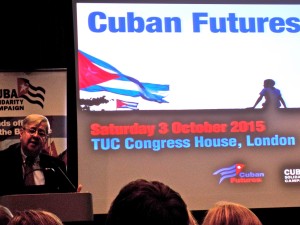
Rafael Hernandez addressing the Cuban Futures Conference opening plenary “December 17th and beyond” Embassies have opened in Havana & Washington, the Miami 5 are free, Cuba is off the terrorist list and Obama and Raul Castro shook hands. What’s next?
Members of the Socialist Labour Party attended the Cuban Futures Conference held at Congress House, TUC HQ in central London last Saturday, October 3rd 2015. The original Socialist Labour Party was set up by James Connolly who was also at one time a member of the Independent Labour Party (ILP) alongside Keir Hardy. The name was revived in 1996 as a response to the removal of Clause 4 from the Labour Party’s constitution under Tony Blair. The leader of the SLP was, and still is, Arthur Scargill. This took Connolly’s Socialism on board and setting a distinctive tradition strongly opposing the social-democratic and neo-liberal trends in both the Labour Party and politics in general.
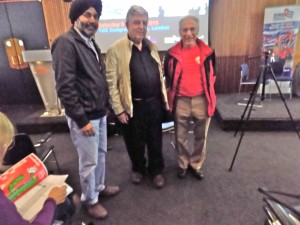
Bhagwant Singh, John Tyrrell and John Mcleod at the Cuba Futures Conference organised by Cuba Solidarity Campaign
The SLP has been involve in two delegations to Cuba in the last decade. The first in 2008 was to attend the Conference Marxism in the 21st Century in Havana. It was then I became very much aware of a different perspective at work which was not confined to Cuba, but was having a far reaching effect on South American and Caribbean countries determined to counter the effects of their dominating neighbour to the north, the USA. Four years later it was apparent that joint organisations being developed like ALBA (Bolivarian Alliance for the Peoples of Our America) were gaining momentum with Venezuela and Bolivia having elected Socialist governments and many others supporting the Cuban position, including Brazil and Argentina. Equador and Nicaragua also became prominent with their Ambassadors speaking at the London Conference giving testimony to Cuban achievement and leadership.
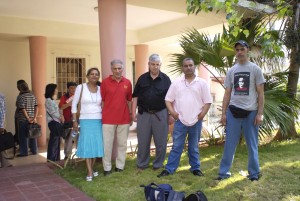 SLP members in Cuba in May 2008 to attend the Conference Marxism in the 21st Century. l to r Lily and John Mcleod, John Tyrrell, Shangara Singh and Sheera Johal
SLP members in Cuba in May 2008 to attend the Conference Marxism in the 21st Century. l to r Lily and John Mcleod, John Tyrrell, Shangara Singh and Sheera Johal
No one claims, least of all Cubans themselves, that they have found answers to issues confronting the world and humanity, but as speakers from a variety of backgrounds illustrated how Cuba was succeeding in many ways better than far wealthier states in health, in education, in food production and so on. This was against a backdrop of continuing sanctions in spite of the recent apparent thaw in diplomatic relations between Cuba and the US. Cuban speakers made it clear that they didn’t see a change in the United States intentions, rather a different approach characterised by “charm” rather than aggression. One told us the story of the frog and the scorpion when the latter, incapable of swimming to leave Cuba, asked the frog to carry him to the US. The frog replied that the scorpion would use its sting on him, to which the scorpion replied that he would drown if he did that. Half way across the scorpion did sting the frog who asked in surprise why he had done it. “That’s what scorpions do” came the reply.
Cubans are seeking five major outcomes from the rapprochement with the US, including the return of Guantanamo Bay. The release of the Cuban 5 from their long incarceration is seen as a major step forward, but on other other hand Cuban demands that the perpetrators of the terrorist act in bringing down a Cuban airliner, living in the United States, had not been brought to justice. The five Cubans were arrested after their attempts to do just that.
Cuba is characterised as a dictatorship and undemocratic by the standards of western governments with multi-party systems. However this needs to be countered by understanding how people are elected to govern at three levels: local, provincial and national. In practice it is far more democratic by being inclusive with a far higher level of voter participation normally found in the so-called western democracies.
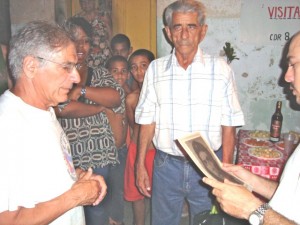
John Mcleod receiving gifts, including a portrait of Che Guevara, from a street committee in Santa Clara, Cuba, on behalf of the Socialist Labour Party in 2008.
The SLP delegations have been welcomed on each of their visits by local communities with festivities taking place in the streets or buildings where they live. Doctors, teachers, police and others involved in provision of services are involved as are members of the community of all ages. In Santa Clara and Havana we were treated to street theatre, dancing and delicious local products including food and wine.
Speakers at the London Conference this year demonstrated Cuba’s achievements in health, exporting doctors and nurses, while maintaining a high level of care at home. Indicators of child mortality at birth was 6 per 1000 compared to 8 per 1000 in the USA. (In the UK it is 5 per 1000. It was pointed out that Cuba used the NHS as a model for its care system. It was hastily qualified to the NHS as it once was!)
Schools and clinics we visited were not lavishly equipped but clearly they manage to carry out excellent work. Gifts of even basic commodities were received gratefully. As the Cubans we met pointed out “we have little, but what we have we share”. 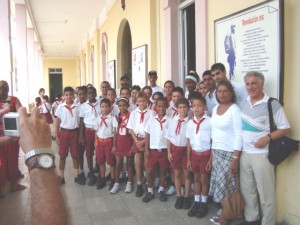
Visiting a school in Santa Clara, Cuba, 2008

Visit to a centre for young people here seeing services demonstrating a rescue exercise. Fidel Castro used to visit regularly on his birthday.
The Conference was against a backdrop of events on and after 17th December, 2014 when there was an apparent thaw in relations between Cuba and its powerful neighbour to the north, the United States of America.
Later in April 2015 President Obama announced that Cuba is of the list of state sponsored terrorists.
So what of the future? How far have things changed? Cuban speakers were cautious believing that what they were seeing was a change in tactics by the US rather than a fundamental shift in their attitude to Cuba, aggressive posturing being replaced by a charm offensive. Cuba they still see as an undemocratic dictatorship as a one party state. The gains of the Revolution will have to continue to be defended, including “health, internationalism, educations, women’s rights”. Others, including the US can learn much from Cuba.
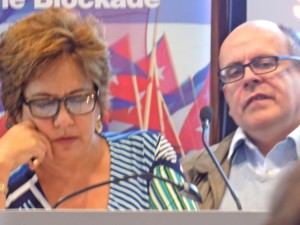
Arleen Rodriguez with translator on Cuban Futures. The return of Guantanamo Bay remains unresolved as does the Blockade and compensation for 50 years of aggression.
It was felt that the support of many South American and Caribbean countries was instrumental in convincing the US that a new approach was necessary, as was world solidarity seen here today. It was noted that Obama still talks about “trading with the enemy” while Kerry referred to the relationship as “neighbours” rather than “friends”. A resolution to end the blockade will be taken to the UN. How will the Obama administration vote? Cuba will not be going cap in hand but proceed with a dignified conscience to maintain a dignified sovereignty based on a record of solid achievement.






